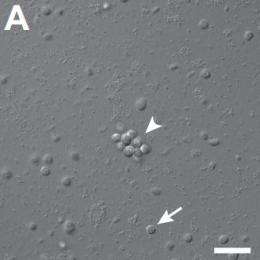August 16, 2012 report
Researchers find bacteria causes a single celled organism to form colonies

(Phys.org) -- Researchers working at a lab at Berkeley University, led by Nicole King, have uncovered the first example of a kind of bacteria that causes a single celled organism to form a colony, a finding that has implications for researchers looking into the origins of multi-celled organisms in general. The team has published their findings on the lab’s web site and their paper will appear in the first edition of the new open source journal eLIFE.
The team’s research centers on choanoflagellates, single celled organisms that swim around in water using their tails. In some settings, they swim around independently, while in others they form colonies in the shape of rosettes. King and her team spent several years trying to figure out why they sometimes go solo, and sometimes don’t. At one point, they applied an antibacterial agent to the environment in which specimens of organisms were living and found that afterwards, they all quit forming into colonies. That led to a search through some sixty strains of bacteria to determine which had caused the change. They finally found it, a new species, Algoriphagus machipongonensis. But of course, that was just the beginning. Next the team tore apart the bacteria trying to figure out what unique property it held that caused choanoflagellates to form into a colony. That led them to a lipid molecule they have named Rosette-Inducing Factor 1 (RIF-1). When choanoflagellates ingest the bacteria, they get a very tiny amount of RIF-1, and that is all it takes, apparently, for the daughter cells that are spawned to form the rosettes.
The findings have added importance because researchers have long thought that choanoflagellates are animals closest relative, which means that it’s possible that bacteria and the molecules they produce, could conceivably be part of the reason that single celled organisms first began to form colonies, leading eventually to multi-celled beings that evolved over time into all of the animals that are alive today.
Not everyone is onboard with that idea however, as over time, choanoflagellates have evolved just as have all the organisms that evolved from whatever the first multi-celled organisms actually were, but this new finding does hint at the possibility that we all owe our existence to a bacteria similar to A. machipongonensis living all those years ago.
There are still questions to be answered as well, such as what about RIF-1 causes the choanoflagellates to form colonies, and do they have to actually eat them to gain the ability to form the colonies or is just being around them enough? King’s team will no doubt be looking to answer such questions while other’s debate the significance of their findings.
More information: Rosanna A. Alegado et al., Bacterial regulation of colony development in the closest living relatives of animals.
ABSTRACT
Bacterially-produced small molecules exert profound influences on animal health, morphogenesis, and evolution through poorly understood mechanisms. In one of the closest living relatives of animals, the choanoflagellate Salpingoeca rosetta, we find that colony development is induced by the prey bacterium Algoriphagus machipongonensisand its close relatives in the Bacteroidetes phylum. Here we show that a rosette inducing factor (RIF-1) produced by A. machipongonensis belongs to the small class of sulfonolipids, obscure relatives of the better known sphingolipids that play important roles in signal transmission in plants, animals and fungi. RIF-1 has extraordinary potency (femtomolar, or 10^-15 M) and S. rosetta can respond to it over a broad dynamic range – nine orders of magnitude. This study provides a prototypical example of bacterial sulfonolipids triggering eukaryotic morphogenesis and suggests molecular mechanisms through which bacteria may have contributed to the evolution of animals.
© 2012 Phys.org


















